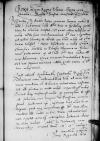Habuimus cf. Ioannes DANTISCUS to Bona Sforza Heilsberg (Lidzbark Warmiński), 1543-10-30, CIDTC IDL 7037, letter lost⌊litterascf. Ioannes DANTISCUS to Bona Sforza Heilsberg (Lidzbark Warmiński), 1543-10-30, CIDTC IDL 7037, letter lost⌋
S(inceritat)is or S(trenuitat)is⌈S(inceritat)isS(inceritat)is or S(trenuitat)is⌉
Tuae ex Heilsberg (Lidzbark Warmiński, Heilsberga), town in Ermland (Warmia), the main seat of the bishops of Ermland⌊HeilsbergHeilsberg (Lidzbark Warmiński, Heilsberga), town in Ermland (Warmia), the main seat of the bishops of Ermland⌋ 1543-10-30⌊paenultima die Octobris1543-10-30⌋ scriptas. Ad quas eodem tempore, cum nobis redditae sunt, mandaveramus S(incerita)ti or S(trenuita)ti⌈S(incerita)tiS(incerita)ti or S(trenuita)ti⌉ Tuae respondere, sed nullus hucusque se obtulit, qui litteras nostras ad S(inceritat)em or S(trenuitat)em⌈S(inceritat)emS(inceritat)em or S(trenuitat)em⌉ Tuam tulisset. Nunc discedente a nobis generoso Stanisław Kostka (*1487 – †1555), as a leader of the so-called nobles' party active in Royal Prussia since 1536, Kostka stood in opposition to most of the members of the Council of Royal Prussia, who wanted to maintain the autonomy of the province and a "balance of power" in terms of governance. The tension between the Prussian Subtreasurer and the Council had been increasing since the Diet in Graudenz (Grudziądz) in 1533. Kostka, connected with the royal court since his youth, was sent to Graudenz as the King's deputy and, contrary to custom, decided to take part in the proceedings. In response to such a step, the Council members stopped the meeting. Kostka accused them of hostility towards the Poles and intervened on this matter at the court. In the absence of the then Bishop of Ermland (Mauritius Ferber) it was Dantiscus who chaired the Graudenz Diet. The incident badly harmed his future relationships with Kostka; 1531-1555 Treasurer of the Prussian lands and Treasurer of Marienburg (Malbork); 1544-1545 Castellan of Elbing (Elbląg), 1545-1546 Castellan of Kulm (Chełmno); 1546-1549 Vice-Voivode of Kulm; 1546-1551 Voivode of Pomerania; 1551-1555 Voivode of Kulm (PSB 14, p. 356; Urzędnicy 5/2, p. 216; MAŁŁEK 1976, p. 119-123)⌊Stanislao KosthkaStanisław Kostka (*1487 – †1555), as a leader of the so-called nobles' party active in Royal Prussia since 1536, Kostka stood in opposition to most of the members of the Council of Royal Prussia, who wanted to maintain the autonomy of the province and a "balance of power" in terms of governance. The tension between the Prussian Subtreasurer and the Council had been increasing since the Diet in Graudenz (Grudziądz) in 1533. Kostka, connected with the royal court since his youth, was sent to Graudenz as the King's deputy and, contrary to custom, decided to take part in the proceedings. In response to such a step, the Council members stopped the meeting. Kostka accused them of hostility towards the Poles and intervened on this matter at the court. In the absence of the then Bishop of Ermland (Mauritius Ferber) it was Dantiscus who chaired the Graudenz Diet. The incident badly harmed his future relationships with Kostka; 1531-1555 Treasurer of the Prussian lands and Treasurer of Marienburg (Malbork); 1544-1545 Castellan of Elbing (Elbląg), 1545-1546 Castellan of Kulm (Chełmno); 1546-1549 Vice-Voivode of Kulm; 1546-1551 Voivode of Pomerania; 1551-1555 Voivode of Kulm (PSB 14, p. 356; Urzędnicy 5/2, p. 216; MAŁŁEK 1976, p. 119-123)⌋, in Royal Prussia (Prussia Regalis), region, part of Prussia annexed to the Kingdom of Poland in 1466 under the provisions of the Second Peace of Thorn⌊PrussiaRoyal Prussia (Prussia Regalis), region, part of Prussia annexed to the Kingdom of Poland in 1466 under the provisions of the Second Peace of Thorn⌋ thesaurario, noluimus praetermittere, quod ad litteras S(inceritat)is or S(trenuitat)is⌈S(inceritat)isS(inceritat)is or S(trenuitat)is⌉ Tuae respondere illi non debeamus. Quas una cum novitatibus, de quibus nos saepius certiores reddit, grato animo a S(inceritat)e or S(trenuitat)e⌈S(inceritat)eS(inceritat)e or S(trenuitat)e⌉ Tua accipimus.
Quod attinet Stanisław Sokołowski of Wrząca Wielka son of Jarosław Jan Sokołowski of Wrząca Wielka (d. 1517/1518); 1540-1557 (or 1559?) starosta of Rogoźno (PSB 40/1, p. 146-147 (RUTKOWSKA, "Sokołowski Jarosław Jan z Wrzący Wielkiej"))⌊SzokolowskiStanisław Sokołowski of Wrząca Wielka son of Jarosław Jan Sokołowski of Wrząca Wielka (d. 1517/1518); 1540-1557 (or 1559?) starosta of Rogoźno (PSB 40/1, p. 146-147 (RUTKOWSKA, "Sokołowski Jarosław Jan z Wrzący Wielkiej"))⌋, capitaneum Rogoznensem, voluimus cum credentialibus litteris ad eum intimare mandata et declarare voluntatem nostram. Sed ille forsan eo modo nihil responderet nobis. Potius itaque visum est nobis, quod quam primum se offeret cubicularius regius in Royal Prussia (Prussia Regalis), region, part of Prussia annexed to the Kingdom of Poland in 1466 under the provisions of the Second Peace of Thorn⌊PrussiamRoyal Prussia (Prussia Regalis), region, part of Prussia annexed to the Kingdom of Poland in 1466 under the provisions of the Second Peace of Thorn⌋ proficiscens, scribemus ipsi capitaneo litteras nostras in eo negotio, quod non incognitum est S(inceritat)i or S(trenuitat)i⌈S(inceritat)iS(inceritat)i or S(trenuitat)i⌉ Tuae. Per eundem ille respondet nobis, nam cubicularius non discedet, priusquam rescriptum habuerit.
Bene tandem valeat.


 BCz, 1601, p. 718
BCz, 1601, p. 718